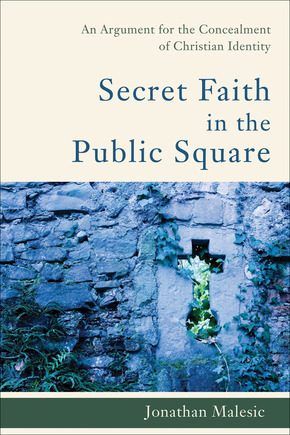Jonathan Malesic: Secret Faith in the Public Square
 Jonathan Malesic, Secret Faith in the Public Square: An Argument for the Concealment of Christian Identity (Grand Rapids: Brazos Press, 2009), 248 pages, ISBN 9781587432262.
Jonathan Malesic, Secret Faith in the Public Square: An Argument for the Concealment of Christian Identity (Grand Rapids: Brazos Press, 2009), 248 pages, ISBN 9781587432262.
From outward appearance the author, an assistant professor of Theology at King’s College in Pennsylvania, argues for non-public involvement in public affairs with nothing said of the participants’ Christian faith. His expressed concern is that Christian identity be protected from being exploited as a means for political gain. Malesic, in his introduction, writes that “too often in American public life, the light is used to illumine the Christians themselves, bringing glory to the wrong person”(p. 19). The light, in this sentence, refers to “Christian identity.” By concealing one’s own identity, it is easier to bring the identity of Jesus to bear in public life.
In developing his theme, Malesic first explains that what he does not want to do is to create a privacy of Christian life in opposition to anything public. “Most often ‘public’ is set in opposition to ‘privacy’” (p. 21). It is a false dichotomy. His proposal is to define what individual Christians should do “when non-Christian publics, especially the overarching and competitive public spheres of government, work, and the market pose danger to the integrity of the Christian public” (p.23).
The author’s basic premise is based upon Matthew 6:1,6 where Jesus enjoins those listening to him “Beware of practicing your piety before others in order to be seen by them …” The full quotation is printed on the page facing the table of contents. Malesic sets forth his argument in two parts. The first part sets forth both the biblical and the theological rationale for secrecy of identity in the public square. He not only cites Jesus but also the liturgical secrecy set forth by Cyril of Jerusalem in the late fourth century when the life of the church and the life of the empire appeared to be fusing. After discussing the position of Cyril, he moves on to discuss in two succeeding chapters later the contribution of Soren Kierkegaard’s Works of Love which appeared in the mid-nineteenth century. In chapters five and six Malesic devotes attention to Dietrich Bonhoeffer and his famous work, The Cost of Discipleship. Melasic’s explanation of Bonhoeffer’s view of discipleship is that “Christians confess their Christian identity in secret and conceal that identity in public” (p. 123). The distinctively Christian form of public life is that of “being for others.” While Christians’ works of love should bear visible fruits, the Christian identity of the one who lives for others need not be intentionally made known.
Part two of Secret Faith in the Public Square which comprises chapters seven through nine takes the arguments from Scripture, Cyril, Kierkegaard and Bonhoeffer and takes the idea of concealment of Christian identity as it may work out in contemporary America. Malesic does not rely exclusively on the three men just mentioned. He also relies upon models set forth by Avery Cardinal Dulles, S.J. The church grew and had influence upon its pagan environment by offering an alternative more attractive: “Seeing the mutual love and support of the Christians and the high moral standards they observed, the pagans sought entrance into the Church.”[1] In this recognition, Malesic’s position is not one of withdrawal from the public square but a quiet lifestyle as opposed to a vocal or visible involvement. He also differs from Stanley Hauerwas, who is close to Malesic in sentiment but who challenges Christians “to stand as a visible social and political alternative to the violent ways of the world, bearing witness to the gospel in works of love and mercy” (p. 28). The key word is “visible” as opposed to “secret.” Yet in reading Secret Faith in the Public Square, it appears that what Malesic is advocating is not a secretive Christianity but a Christianity working “behind the scenes” rather “out front” advertising itself.
Category: Living the Faith, Spring 2014


